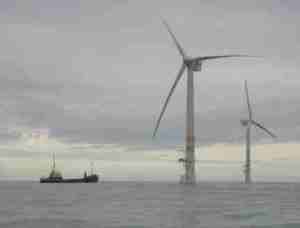Keep blowing wind power forward
The exciting possibility of harnessing significant wind power using giant turbines offshore on Lake Michigan moved closer to reality last week.
State officials said three developers are contemplating various ways to erect hundreds of wind turbines on the water that could transmit clean energy back to land.
The plans are only conceptual. Yet state officials are wisely encouraged and seriously exploring several options, potential costs and hang-ups.
Wisconsin is not a windy state. And attempts to build giant wind turbines on land in the past have faced fierce opposition from some neighbors who don ‘t like the look or sound of them.
That ‘s what makes the prospect to putting turbines on lakes Michigan and Superior so appealing. The wind over the lakes is notoriously strong. And if positioned far enough off land, the turbines won ‘t be visible to shoreline property owners who might otherwise object.
Photo from the National Renewable Energy Lab.

